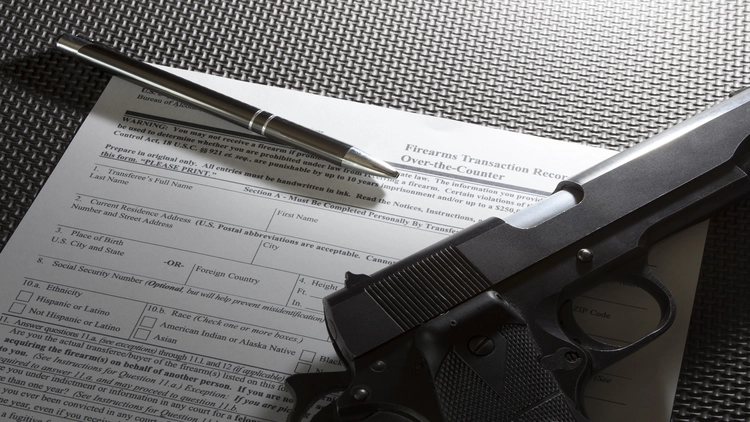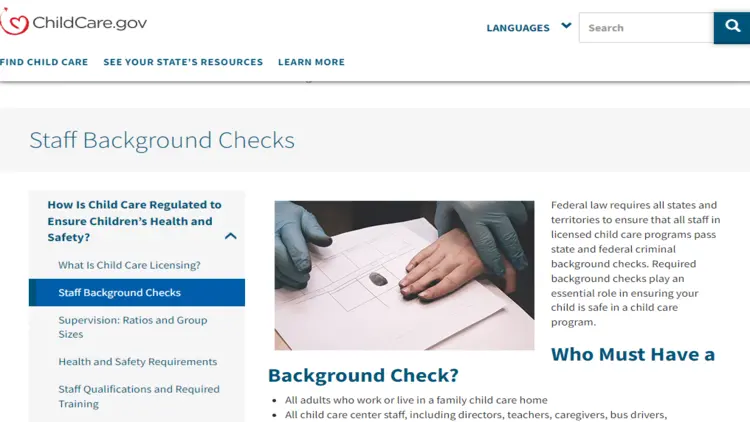
Comprehensive background checks are not your average public records lookup. They go beyond basic identity verification and involve longer timelines and multiple steps like submitting fingerprints and even FBI agents conducting interviews.
To be clear, they are not common. Usually, a lower-level identity or employment history check is performed. However, sometimes a much deeper check is needed.
Some of the common use cases for these high-level checks include:
- Very large purchases such as homes or businesses
- Employment for high-risk jobs such as those in the medical and legal field
- Employment of top-level positions like those found in the corporate suite (CEO, COO, CFO, CTO, etc.)Preview Changes (opens in a new tab)
- Election to public office at the state or national level
- Employment for jobs involving vulnerable people such as children and elderly
- Purchases of weapons and other hazardous items that present a concern for danger to others
Simply put, comprehensive background checks can help to eliminate liability and even save lives.
Read on to learn about what these comprehensive background checks include, more potential uses, and how to have a comprehensive background check performed on yourself or others via service providers that specialize in these unique types of checks.
What Is a Comprehensive Background Check?
First, it’s important to know what exactly a comprehensive background check is and how it differs from other types. For example, background check findings for level 1 will differ significantly from a comprehensive level 3 check.
Before continuing, It is important to note that there are several aspects of your identity as a person that cannot be evaluated.
These elements include your personal identifying traits, such as:
- Religious affiliation
- Sexual orientation
- Gender identification
- Age
- Disability status or medical condition
The use of any of these criteria to form a basis of a decision is expressly permitted and even illegal.
A comprehensive background check refers to either level 2, level 3, or level 4 background checks.
A quick review of the types will help explain further.
Level 1 (Not Considered a Comprehensive Background Check)
Level 1 background checks refer to checks that are done using someone’s name and are limited to a specific area. For example, the results will only show records from a particular state or county and will completely exclude information at the federal level.
Furthermore, this check is typically used for identity and employment history verification and doesn’t include criminal background check information. It’s also common to use this for a marital background investigation or other personal search.
The benefits to a level 1 background check are that it is quick and you can receive a report typically within just minutes.
Level 2 Comprehensive Background Checks
The first type of comprehensive check, and the least intensive, is a level 2 background check. This will include all of the information produced in a level 1 check but instead of showing results for a single jurisdiction, the report will include records at the national or federal level. These checks are often done to dig up criminal records and are used for more sensitive job positions like those in banking or law firms. They are also commonly used for obtaining a police clearance document in the United States.
However, there are many use cases. Church volunteers may be asked to undergo a level 2 check before being able to work in youth ministries, for example.
The uses come in many sizes and forms. It simply comes down to the need to eliminate all doubt regarding someone’s clean criminal record.
Level 3 Comprehensive Background Checks
A level 3 background check is the most used comprehensive report. If someone simply refers to a comprehensive background check, this is likely what they mean. This can include things that are considered “no longer existent,” such as expunged records. However, this is usually only seen in an FBI-level check, which is considered a unique type of comprehensive background check.

It consists of many different elements, including those in both a level 1 and level 2 check:
- Criminal history screening
- Education verification
- Employment history verification
- Checks of available references
- Drug testing
Keep in mind that different providers may include other elements as well, such as rental history or credit check.
Because of the intensive nature of a level 3 check, it is often advised to wait until all other criteria have been met. If the person has passed all other requirements, then is time to run the check–not before.
The Most Comprehensive Background Check (Level 4)
Also referred to as an “executive check,” level 4 comprehensive background checks are used when huge liability is at stake–typically revolving around hiring for a top-level position in a company or election to public office. In addition to information reported in the previous, lower-level checks, level 4 reporting will include checks for bankruptcy as well as mentions in the media or deep website archives.
What Is Included in a Comprehensive Background Check?
They will verify your identity via your social security number, or other relevant associated information if you are not a natural-born citizen.
They will also review your resume and contact any previous employers or institutions to verify what you claim as your possible certification, education, or previous work experience.
This is not only to vet you but to protect themselves against possible litigation from mismanagement of the position or any mistakes that could be made if you are not truthfully trained and educated for the position.
When undergoing a comprehensive background check, you can expect that your criminal record will be reviewed as well, excluding expunged records if an FBI check is performed. This is especially common if you are seeking any positions with government institutions, school districts, and jobs where you would encounter children or opportunities in the healthcare or legal fields.
Worth stating again that a level 3 comprehensive background check can even show expunged records via the FBI’s database that are not otherwise available on a level 2 check.
When To Use Comprehensive Criminal Background Checks
Your employer may believe that it is appropriate to review your criminal record, via a focused comprehensive criminal background check. This may be used to protect them from potential litigation if you have a criminal history, especially with violent or sexual crimes. While some crimes are removable from your record via the process of legal expungement and can only be viewed by an FBI check, certain crimes cannot be removed and will stay on record permanently.2

You may be asked to undergo a criminal background check as a condition of employment or involvement if:4
- You work with children or could come into contact with children
- You work in the healthcare field
- You work in the legal field
- You work in a government institution
- You work in a financial institution
- You work in a high-risk job with valuables and access to money
- You work in a law enforcement agency
Please keep in mind this is not an exhaustive list. These reports can be utilized whenever it makes sense, as long as the person running the report has the consent of the individual being searched.
Comprehensive Background Check for Gun Purchases
In the USA, roughly half of the 50 states require comprehensive background checks if you wish to purchase a firearm. This is an effort to keep firearms from being abused and to ensure they are purchased by responsible gun owners who do not pose a threat to their community or society at large.

The goal behind this legislation is not intended to limit national Second Amendment rights but aims to limit the risk of gun sales to at-risk individuals who could potentially use the weapon to cause harm.
A licensed seller will submit the inquiry to the NICS, otherwise known as the National Instant Criminal Background Check System, launched in 1998 to help prevent firearm abuse.3 The name will then be run through the database with the use of an ATF form that is procured at the location of the licensed seller.
Your record will be checked for criminal activity, or anything else (such as mental health center admittances, etc.) that could bar or deter you from owning a firearm.
While this is not required in all 50 states of the United States, it is required within 21 states as of August 2021.5
Other states are actively working to pass similar legislation that will allow for more comprehensive background checks for potential gun owners and the millions of Americans in cities around the Nation.
According to ChildCare.gov, these types of background checks are required for anyone working with children,1 with requirements varying by the state as to what constitutes a comprehensive background check. Possible jobs that may require a comprehensive childcare background check include:
- Employees in close-contact spaces with children, such as the medical field
- Employees of daycare centers
- Employees of care or group homes
- Employees of childcare programs
- Employees of school districts and after-school programs

(Image: ChildCare.gov6)
Your comprehensive background check will be in-depth and likely require formal fingerprinting. After the fingerprinting process, your fingerprints will be sent to the FBI to be scanned against their criminal database, along with several other state and local databases. Your name and record will be searched in a variety of databases, including:
- The FBI’s Criminal Database
- National & State Sex Offender Registries
- National & State Criminal Offender Registries
- Any other relevant databases based on requirements in your state of residence, or other states you have held occupancy in within the past 5 years
Depending on the laws in your state, this can either be a level 2 or level 3 check.
The purpose of these checks is to ensure that children are put in a safe environment, where potential risks to their health and safety have been cleared and managed. Unfortunately, this is not a completely foolproof process, as unfortunate stories of abuse in schools surface and more teachers are brought to justice.
Comprehensive background checks take steps to protect both students and employees from potential risks and provide the most transparent childcare solutions possible for parents through school programs, school districts, childcare centers, and other related activities.
Most Comprehensive Background Check Available
A comprehensive background check is the most in-depth and comprehensive option you have when it comes to record searching and review.
When an employer requests this type of check, you will have your identity verified with your government documents and records, your claims to employment and education verified by outside institutions, and your criminal background reviewed to ensure that you do not pose a risk in the job that you are chosen for. In cases like a California records check, it will also comply with federal and state laws.
The Best Comprehensive Background Check Online
Many services provide platforms where users can submit requests for an online background check. This is especially helpful, as these services provide accurate information with a quicker turnaround time than it would be to submit the request manually via letter mail.
Some of the top services in the industry of providing comprehensive background checks include:
GoodHire
GoodHire provides detailed reporting and bespoke background check services that allow employers to get an in-depth view of potential candidates. Services include what is normally considered relevant in a comprehensive background check, and add-on services can be purchased, including global court records, licensure verification with other professional entities and agencies, and more.
Truthfinder
Truthfinder quickly provides accurate and detailed reporting for your comprehensive background check needs and gives your employers a detailed picture of your certifications, education, and prior work experience.
Checkr
Checkr is a comprehensive background check service that believes in fair hiring practices and provides a well-rounded view of potential employees. Checkr can also be used for other, lower-level verification such as employment verification, drug and health screening, driving record verification, and more.
List of All Comprehensive Background Check Companies
There are many agencies that provide comprehensive background checks, or lower-intensity background checks with relevant information such as confirming names, addresses, income, and more. You can review the full list of agencies that provide these services below.
- Goodhire
- Checkr
- Truthfinder
- FirstAdvantage
- Cozy
- Intelius
- Spokeo
- Rentberry
- ClearChecks
- SterlingCheck
- Infotracer
- InstantCheckmate
- CertnLime
- SentryLink
- Intellicorp
- Justifacts
- Accurate Now
- Background Report
- Onfido
- Asurint
- InfoMart
- Trusted Employees
How Long Does a Comprehensive Background Check Take?
The time that a comprehensive background check takes varies depending on what is entailed in your check. If you have your fingerprints taken, as in a typical level 3 check, it is required that they go through a national database and review process.

For that reason, it can take between 7-10 days for the evaluation to be complete, sometimes longer depending on the circumstance. If using a platform alone, you may be able to see your results any time within the current hour that you request, and 3-5 days. It depends solely on what is being checked, and what the record shows.
A check involving the Federal Bureau of Investigation can take even longer unless a fast-track FBI screening process is used.
It is important to note that you can assist your employer in expediting a level 1 background check process by doing some of your own research. If you have prior qualifications, degrees, or work history, you can opt to do the digging yourself.
Source the information yourself, and connect with older references or contacts from prior employment opportunities. Find copies of your graduation certificates, documentation of certifications, or other supplemental information that can support the claims you make on your resume and interview. Being upfront with your employers and presenting as much information as possible can expedite the process and may speed up their decision for hire.
What Does Employment Verification Look Like?
Employment verification is common in all levels of background checks. This occurs when an employer reaches out to either your old workplaces or requests copies of your W-2’s to verify your employment claims.
This is to ensure that you have the relevant information and experience and that you are the right candidate for the job based on your qualifications. This is standard practice at most workplaces, so it is always best to be as transparent as possible when claiming employment or experience on your resume or in your interview.
There’s No Excuse for Skipping This Process
Whether you’re an employer hiring for a high-level position, a childcare center owner vetting for new helpers, or a law firm searching for new paralegals–and everything in between–you should consider this process mandatory.
A failure to run a comprehensive background check when there is time, money, and public safety on the line, can lead to disastrous consequences that could have been avoided with just a few minutes spent online.
Frequently Asked Questions About Comprehensive Background Check







